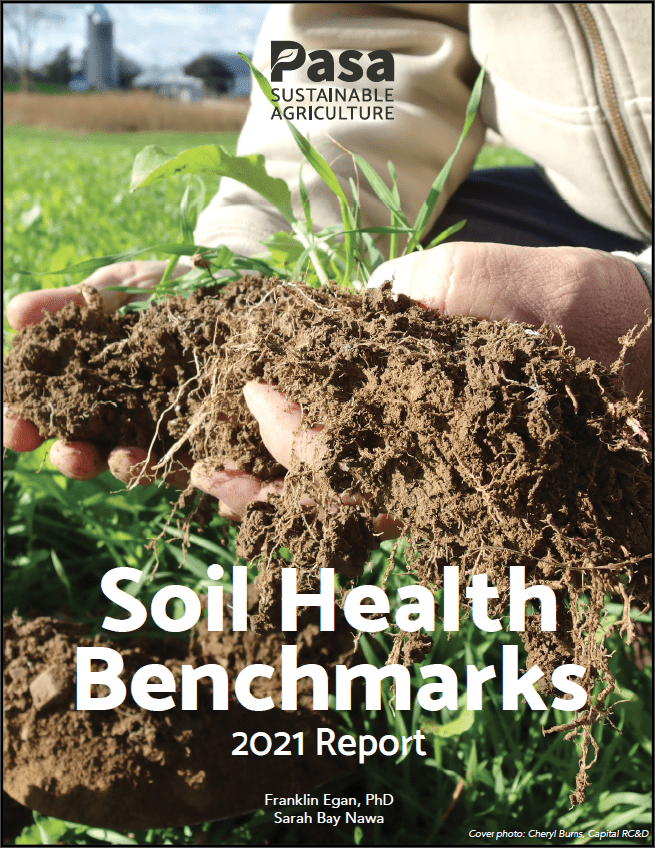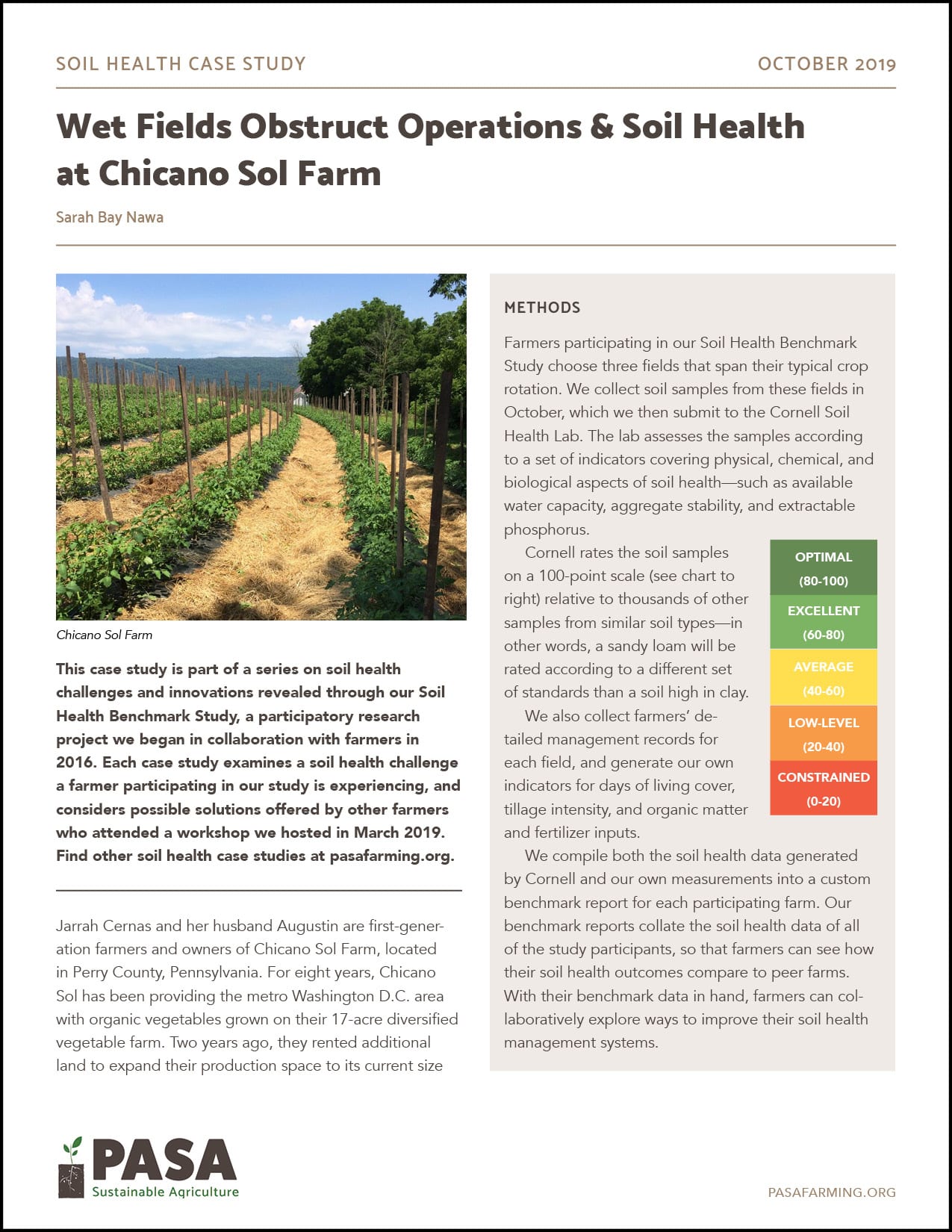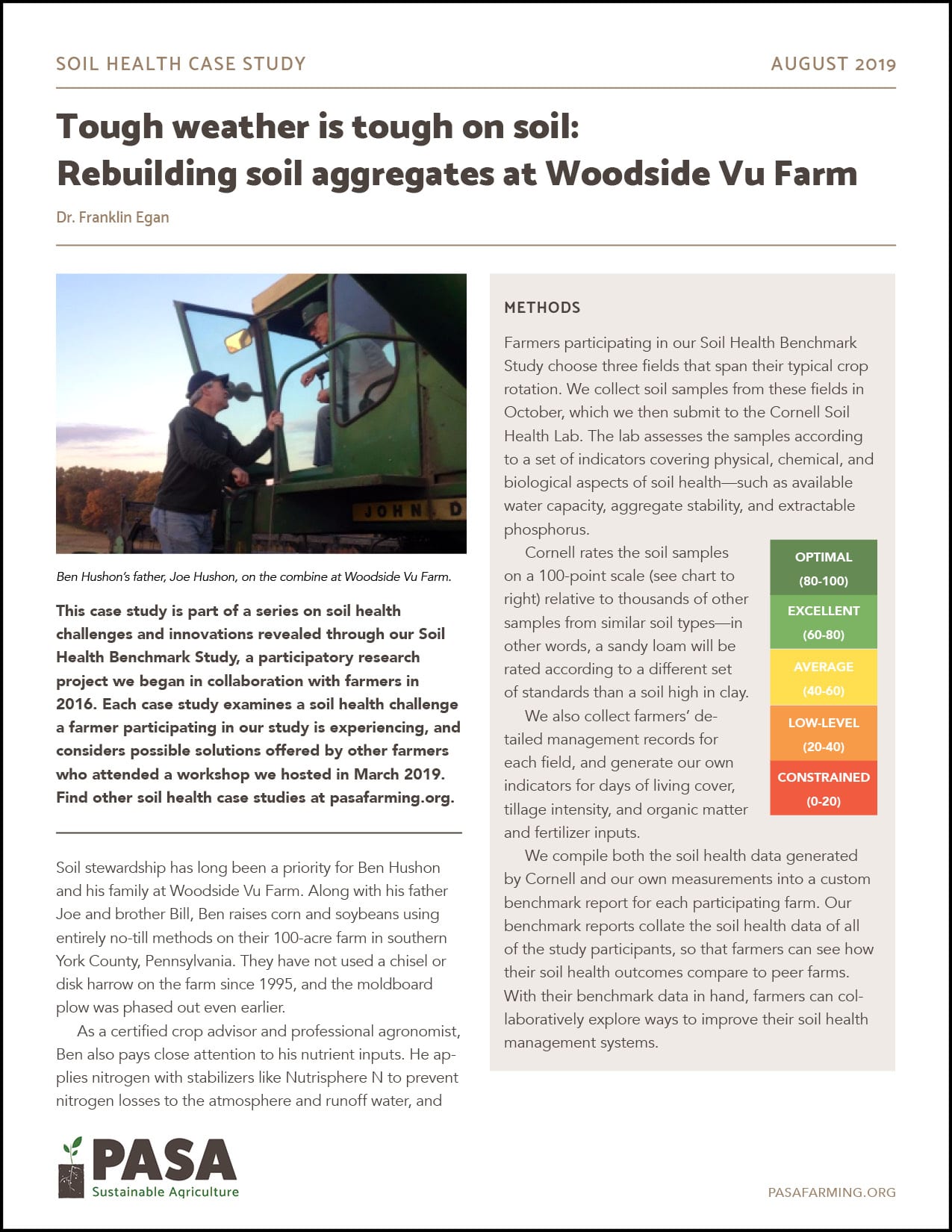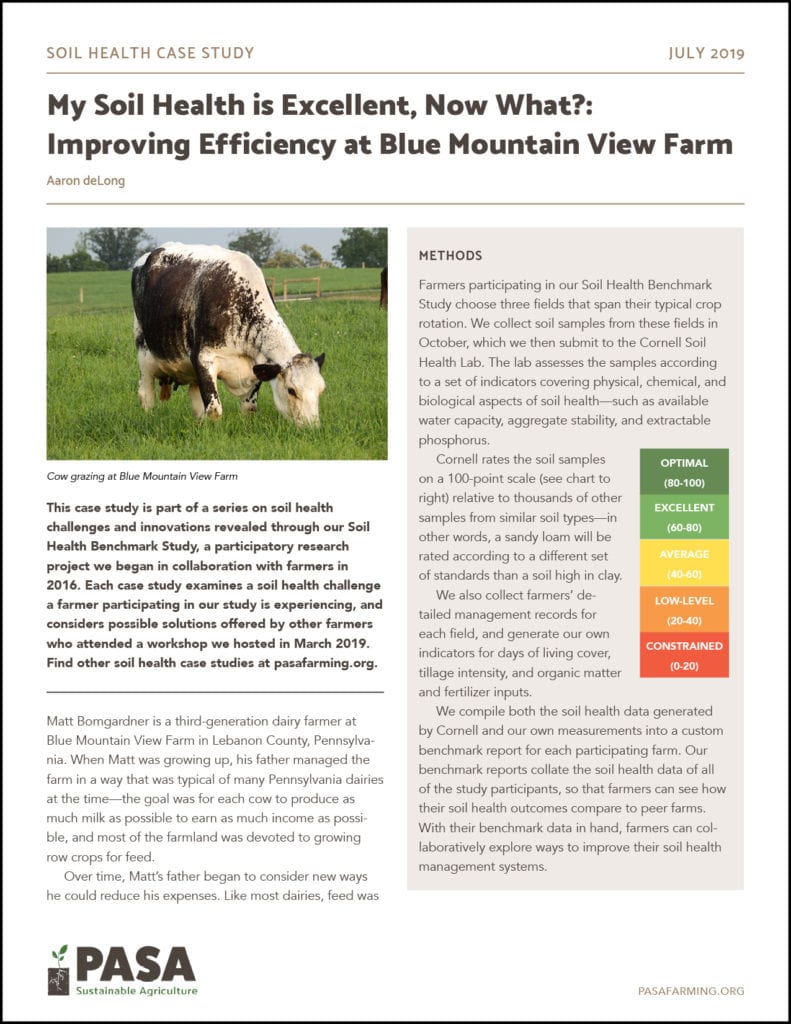The post Quick-Guide to NRCS Programs appeared first on Pasa Sustainable Agriculture.
]]>Download our quick-guide to learn how NRCS can help your farm.
This free resource was produced with support from National Sustainable Agriculture Coalition (NSAC).
The post Quick-Guide to NRCS Programs appeared first on Pasa Sustainable Agriculture.
]]>The post What an FSA Farm Number Can Do for You appeared first on Pasa Sustainable Agriculture.
]]>Download our fact sheet to learn the why and how of obtaining an FSA farm number.
This free resource was produced with support from National Sustainable Agriculture Coalition (NSAC).
The post What an FSA Farm Number Can Do for You appeared first on Pasa Sustainable Agriculture.
]]>The post Flood Impacts & Solutions appeared first on Pasa Sustainable Agriculture.
]]>How can farms help mitigate floods and protect communities downstream? (Hint: it starts in our soil!)
Increased flooding is one of the most immediate and devastating impacts of climate change. In Pennsylvania, the record rainfall of 2018 took a huge toll on farms across the Commonwealth and caused millions of dollars in infrastructure damages to towns and cities downstream.
The good news is that farms can be at the forefront of flood mitigation and protection.
Join us for this virtual listening session, where you’ll learn from a farmer and several conservation experts about how building soil organic matter can play a critical role in flood retention.
Complete this form to watch the recording:
The post Flood Impacts & Solutions appeared first on Pasa Sustainable Agriculture.
]]>The post Alley Cropping at Many Streams Farm appeared first on Pasa Sustainable Agriculture.
]]>Alley cropping is a type of agroforestry practice where farmers grow annual or perennial crops in “alleys” between rows of trees selected for their environmental and income-producing benefits. This agroforestry case study highlights a nonprofit farm that worked with Pasa Sustainable Agriculture to design an alley cropping site plan that would address natural resource concerns on their land.
The post Alley Cropping at Many Streams Farm appeared first on Pasa Sustainable Agriculture.
]]>The post Alley Cropping at Weavers Way appeared first on Pasa Sustainable Agriculture.
]]>Alley cropping is a type of agroforestry practice where farmers grow annual or perennial crops in “alleys” between rows of trees selected for their environmental and income-producing benefits. This agroforestry case study highlights an urban farm that worked with Pasa Sustainable Agriculture and Interlace Commons to design an alley cropping site plan that would accomplish its unique goals.
The post Alley Cropping at Weavers Way appeared first on Pasa Sustainable Agriculture.
]]>The post Alley Cropping at Good Work Farm appeared first on Pasa Sustainable Agriculture.
]]>Alley cropping is a type of agroforestry practice where farmers grow annual or perennial crops in “alleys” between rows of trees selected for their environmental and income-producing benefits. This case study highlights a draft-horse powered diversified vegetable farm that worked with Pasa Sustainable Agriculture and Interlace Commons to design an alley cropping site plan that would accommodate its unique goals.
The post Alley Cropping at Good Work Farm appeared first on Pasa Sustainable Agriculture.
]]>The post Get to know: Alley Cropping appeared first on Pasa Sustainable Agriculture.
]]>
The post Get to know: Alley Cropping appeared first on Pasa Sustainable Agriculture.
]]>The post New Soil Health Tools, Insights & Opportunities appeared first on Pasa Sustainable Agriculture.
]]>Learn about the latest data from Pasa’s Soil Health Benchmark Study, get research updates from Rodale Institute, discover new soil health and decision management tools for your farm, and find out about funding opportunities to support soil health practices on your farm. Find a PDF version of our slides on Soil Health Funding Opportunities here.
Recorded March 29, 2022
Complete this form to watch the recording:
The post New Soil Health Tools, Insights & Opportunities appeared first on Pasa Sustainable Agriculture.
]]>The post Alley Cropping: Planting Trees for Economic & Ecological Diversity appeared first on Pasa Sustainable Agriculture.
]]>Alley cropping is an agroforestry technique that incorporates trees between rows of crops to increase both biological and economic diversity. We’re working with local farms that will serve as demonstration sites for the benefits of alley cropping.
Learn about two farms adopting this agroforestry practice in the Keystone State.
Recorded December 1, 2021
Complete this form to watch the recording:
The post Alley Cropping: Planting Trees for Economic & Ecological Diversity appeared first on Pasa Sustainable Agriculture.
]]>The post Listening Session: Siting & Design for Farm-Based Solar appeared first on Pasa Sustainable Agriculture.
]]>Many groups are making recommendations for where utility-scale solar arrays should (or shouldn’t) be placed. But what would farmers like to see? And what are the considerations for siting solar on farms in a way that doesn’t disrupt agricultural production? In this webinar you’ll hear from a panel including a farmer who has successfully integrated solar on his operation and representatives from the Pennsylvania Department of Agriculture and Pennsylvania Department of Conservation and Natural Resources.
Recorded August 20, 2021
Find more information on this topic this topic:
Federal Rural Energy for America Program (REAP) Grant
agrivoltaic research at Oregon State University and at Rutgers
American Solar Grazing Association
American Land Trust: Farms Under Threat
Farmland Trust: Dual Use Solar Arrays
Nature Conservancy, North Carolina: Principles of Low Impact Solar
Massachusetts Department of Energy Resources Solar Massachusetts Renewable Target (SMART) Program
Complete this form to watch the recording:
The post Listening Session: Siting & Design for Farm-Based Solar appeared first on Pasa Sustainable Agriculture.
]]>The post Do Healthy Soils Grow Healthier Food? appeared first on Pasa Sustainable Agriculture.
]]>It seems logical that healthier soil could grow healthier food. But how do we measure this and demonstrate it scientifically? Exploring links between the nutrient density of food and the soil it was grown in remains a young field of study—we often have more questions than answers.
The Bionutrient Institute is a collaborative project that seeks to shed light on this topic. In 2018 they began analyzing crops and soil samples from a wide range of farms across the country to help us understand connections between soil health and food nutrition. Pasa partnered with Bionutrient Institute in 2020 to measure the nutrient content of crops grown by farmers participating in our Soil Health Benchmark Study. These analyses can help us understand whether different approaches to field management can produce healthier food.
Helping farmers explore links between soil health and nutrition could additionally offer a valuable marketing tool and a new opportunity to educate customers about the benefits of sustainable practices. Join us to learn more about this national project and what it’s uncovered so far.
Recorded July 21, 2021.
Complete this form to watch the recording:
The post Do Healthy Soils Grow Healthier Food? appeared first on Pasa Sustainable Agriculture.
]]>The post Plant Nutrition for Urban Soils appeared first on Pasa Sustainable Agriculture.
]]>Urban soils can pose unique challenges for growers. Overcoming these challenges to get healthy, high-yield crops takes more than just applying fertilizer. Ideal timing, amount, and type of application can vary from plant to plant. And in order to provide optimal nutritional for your crops, first you have to understand the soil you’re working with.
Learn how to identify your soil’s quality and health issues and address them so you can grow healthy crops this year! We also discuss the opportunities when working with urban soils and how to make the most of your site.
Soil topics covered:
- physical degradation
- nutrient content
- fertilizers and amendments
- different soil tests
This session was part of a year-long series of workshops called “Growing to the Next Level,” held in partnership with Grow Pittsburgh.
Recorded April 13, 2021.
Complete this form to watch the recording:
The post Plant Nutrition for Urban Soils appeared first on Pasa Sustainable Agriculture.
]]>The post Soil Health Benchmarks: 2021 Report appeared first on Pasa Sustainable Agriculture.
]]> What are the soil samples, field management records, and first-hand experiences from 100+ farms telling us about soil health?
What are the soil samples, field management records, and first-hand experiences from 100+ farms telling us about soil health?
Building and preserving soil health is a fundamental component of a secure food system that effectively protects ecosystems and communities. Our Soil Health Benchmark Study is designed to help farmers monitor and evaluate the nuanced soil health strengths and challenges that can exist simultaneously within their fields.
The study was developed and is administered by Pasa Sustainable Agriculture in collaboration with more than 100 vegetable, pastured livestock, and row crop farmers and partners including the Cornell Soil Health Laboratory, Future Harvest and the Million Acre Challenge, Penn State Extension, Rodale Institute, and Stroud Water Research Center.
The study, which began in 2016, is one of the largest and most diverse community soil health research projects in the nation, amassing data from a wide range of farm scales and management systems, soil types, and farmer experiences.
Download our Soil Health Benchmarks 2021 Report below for a detailed review of our study and findings to date. You can also read a summary of our findings here on our blog.
Complete this form to download the report:
The post Soil Health Benchmarks: 2021 Report appeared first on Pasa Sustainable Agriculture.
]]>The post Listening Session: On-Farm Solar Energy appeared first on Pasa Sustainable Agriculture.
]]>Solar companies are actively looking to place industrial arrays on farmland, while many small farmers are interested in installing solar panels for home and community use. We invite farmers, solar industry professionals, and solar energy advocates to join us for a listening session facilitated by Pasa’s policy strategist Sara Nicholas, solar developer Doug Neidich (Greenworks), sheep farmer and solar grazier Caroline Owens (Owens Farm), and American Solar Grazing Association director Lexie Hain.
We’ll consider: Where is solar most compatible with commercial farming? What types of financing and technical development are available? And what policy changes need to happen to accelerate solar development, while balancing the interests of farmers, citizens, and energy companies?
Recorded on October 21, 2020.
The post Listening Session: On-Farm Solar Energy appeared first on Pasa Sustainable Agriculture.
]]>The post An environmental assessment of grass-based dairy appeared first on Pasa Sustainable Agriculture.
]]>These data indicate that grass-based dairy farms can provide environmental benefits to a local watershed, but due to a lower efficiency in milk production, they may increase the aggregate environmental impacts of regional and global supply chains.
Download the article for a full explanation of our methods and findings.
This study was conducted in collaboration with USDA / Agricultural Research Service and findings were published in Agricultural Systems in September 2020.
The post An environmental assessment of grass-based dairy appeared first on Pasa Sustainable Agriculture.
]]>The post Water Farming: Managing Agricultural Lands for Clean & Safe Water appeared first on Pasa Sustainable Agriculture.
]]> Can agriculture transition from a major source of water pollution to a major force for improving water quality and, in turn, for protecting human and environmental health?
Can agriculture transition from a major source of water pollution to a major force for improving water quality and, in turn, for protecting human and environmental health?
This booklet explores how agriculture has the potential to either degrade and deplete, or protect and enrich, our shared water resources.
By understanding the connections between specific farming practices and water quality and quantity, farmers, communities, and government agencies can more effectively work together to nurture a cleaner, more abundant water supply and a healthier, more secure food system.
While the geographic focus for this booklet is Pennsylvania, the core issues discussed—water, farming, and a sustainable future—are global.
Complete this form to download the report:
The post Water Farming: Managing Agricultural Lands for Clean & Safe Water appeared first on Pasa Sustainable Agriculture.
]]>The post Insights on Common Soil Health Challenges appeared first on Pasa Sustainable Agriculture.
]]>Through our Soil Health Benchmark Study, we’re discovering common soil health problems farmers are facing. These soil health issues are happening for a variety of reasons that might include effects from severe weather, unintended consequences from production methods, or simply not having a practical way to implement effective soil-building strategies.
During this webinar, we’ll review several common soil health challenges and explore how farmers are working to fix them. We’ll also explain how you can contribute to the Soil Health Benchmark Study as a community scientist and connect with a peer-community of farmers advancing the art and science of sustainable farming.
Our landmark Soil Health Benchmark Study is the most diverse farmer-led soil science project in the nation.
The post Insights on Common Soil Health Challenges appeared first on Pasa Sustainable Agriculture.
]]>The post Wet Fields Obstruct Operations & Soil Health at Chicano Sol Farm appeared first on Pasa Sustainable Agriculture.
]]>The post Wet Fields Obstruct Operations & Soil Health at Chicano Sol Farm appeared first on Pasa Sustainable Agriculture.
]]>The post Tough Weather is Tough on Soil: Rebuilding Soil Aggregates at Woodside Vu Farm appeared first on Pasa Sustainable Agriculture.
]]>The post Tough Weather is Tough on Soil: Rebuilding Soil Aggregates at Woodside Vu Farm appeared first on Pasa Sustainable Agriculture.
]]>The post My Soil Health is Excellent, Now What: Improving Efficiency at Blue Mountain View Farm appeared first on Pasa Sustainable Agriculture.
]]>The post My Soil Health is Excellent, Now What: Improving Efficiency at Blue Mountain View Farm appeared first on Pasa Sustainable Agriculture.
]]>

